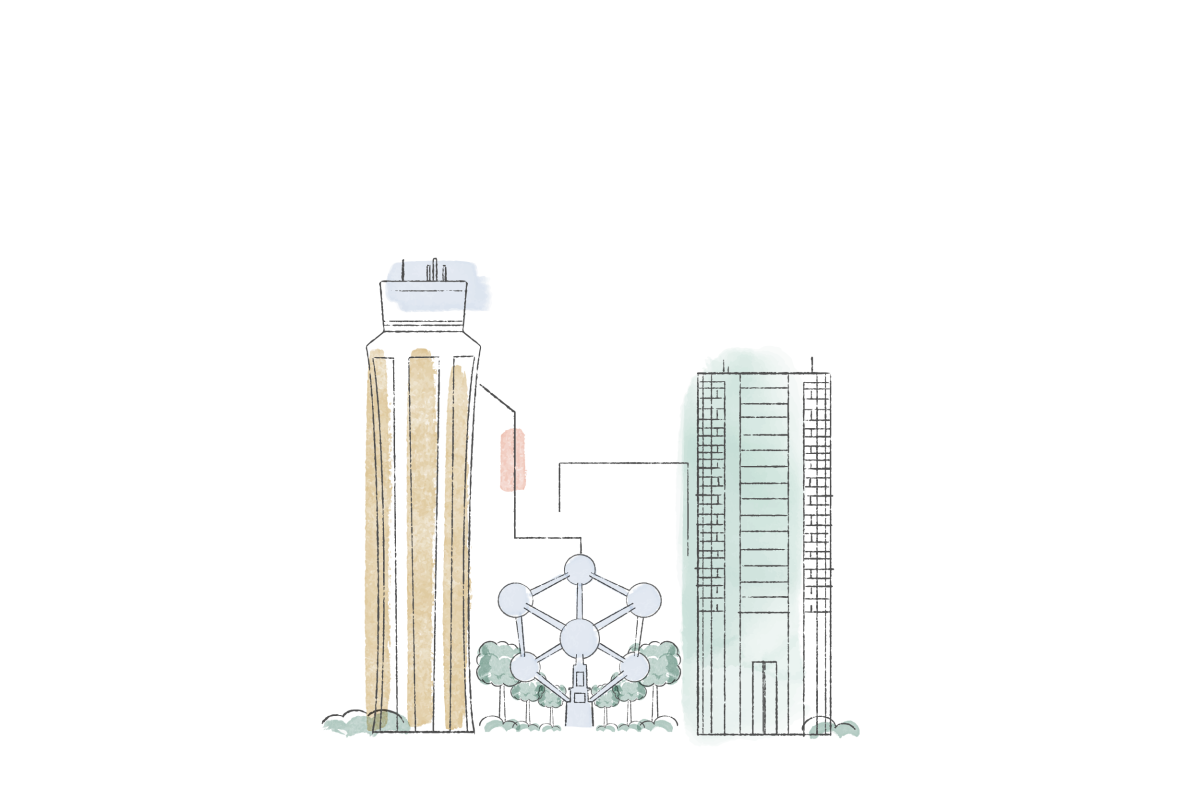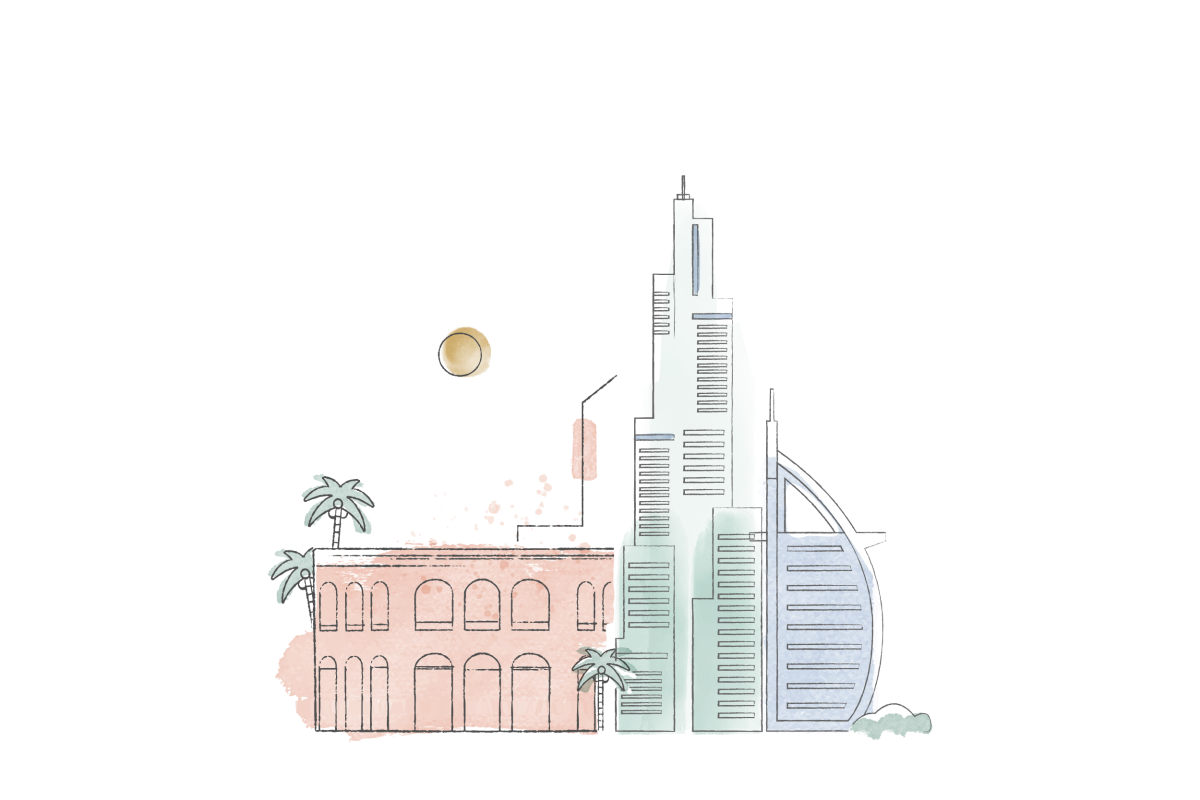The
BENELUX & UAE
Regions
Explore the BENELUX & UAE regions, their advantages and key industries.

Belgium
Belgium is a significant nation for both Europe and the rest of the globe since NATO, the European Commission, and the Council of the European Union all have their headquarters in Brussels, the capital of Belgium. Additionally, the city is home to numerous international banking and insurance companies, which has led some to refer to Brussels as the unofficial capital of Europe.
Belgium's GDP in 2023 was officially estimated at $627 billion, highlighting the country's economic strength.
As a highly developed, trade-dependent nation with a strategic location in Europe, Belgium's economy is diversified across services, industry, and agriculture. This economic mix underlines Belgium's adaptability and its pivotal role in European and global trade networks.
OPEN ECONOMY
Belgium is a globally integrated nation with a very open economy and a fully developed market.
GATEWAY TO CONSUMERS
A corporation based in Belgium has access to the entire EU market and the potential to export its goods and services, making it a gateway to a large consumer base.
GOOD LOGISTICS
Effective distribution is made possible by the nation's well-developed transportation infrastructure, which includes roads, trains, ships, and waterways.
EASE OF COMPANY CREATION
Given the transparency of the institutions and the fact that many essential players in the formation process are multilingual and used to working with foreigners, forming a business in Belgium is a straightforward process that causes no problems for foreign investors.
- Biotechnology
Biotechnology is one of the primary investment sectors in Belgium. Given that the services and goods provided by Belgian biotechnology companies accounted for 16% of the total revenue recorded within the European Union, it is crucial to understand how advanced these businesses are.
- Automotive
Belgium is a major player in the automotive industry, making it a good place to invest if you want to start a business there. Numerous well-known businesses have established facilities in the area because Belgium's climate offers the highly skilled labor force and sophisticated logistics that these businesses require for their operations.
- Pharmaceutics
The pharmaceutical industry is booming in Belgium, which has the most pharmaceuticals produced per person in the world and is a welcoming place for entrepreneurs. At the same time, Belgium has the greatest percentage of workers with a background in biopharmaceuticals. Another crucial factor is that 10% of all Belgian exports are made up of this sector.
The Netherlands
The Netherlands is known for its progressive and tolerant culture, with a long history of openness and international trade. The country has made a successful transition from an agricultural-based economy to a highly developed service-based economy, with a particular focus on finance, logistics, and technology.
The Netherlands is home to many large multinational companies, as well as thriving startups and a highly educated and skilled workforce. The country is known for its innovation and creativity, with a strong emphasis on sustainability and social responsibility.
The Dutch are proud of their cultural heritage, which includes famous artists such as Rembrandt and Van Gogh, and traditions such as cycling and cheese-making. The country has a parliamentary democracy, with a monarch as head of state, and is divided into 12 provinces.
Overall, the Netherlands is a modern, progressive, and forward-thinking nation with a diverse and thriving economy, a culture that values diversity and tolerance, and a strong commitment to sustainability and social responsibility.
In 2023, the Dutch economy experienced a notable slowdown, with its GDP officially estimated at $1.057 trillion. This period was marked by a growth rate of only 0.2%, primarily due to the adverse effects of high inflation on household incomes and a downturn in export volumes.
Despite these challenges, forecasts for 2024 and 2025 are more optimistic, suggesting a gradual path to recovery and growth. This positive outlook is attributed to increased investments from both the government and private sectors, even as the economy navigates through ongoing issues such as labor shortages and the tightening of financial conditions.
- Strategic location and access to markets
The Netherlands' central location in Europe and excellent transportation infrastructure provide easy access to a market of over 500 million consumers. The country has one of the busiest ports in the world, as well as an extensive network of highways, railways, and airports.
- Highly skilled workforce
The Netherlands has a highly educated and multilingual workforce, with a strong emphasis on innovation and entrepreneurship. The country is home to several world-renowned universities and research institutions, which produce a steady stream of talented graduates and researchers for companies to hire. Additionally, the Dutch government offers various programs and initiatives to encourage lifelong learning and upskilling.
- Attractive tax regime
The Netherlands has a competitive tax regime, with a corporate tax rate of 15-25% (depending on the taxable income) and various tax incentives for companies investing in research and development, sustainability, and innovation. The country also has a network of double tax treaties to prevent double taxation on foreign income.
- Stable and business-friendly environment
The Netherlands is known for its stable political and economic environment, with a AAA credit rating and a transparent legal system that protects investors' rights. The country has a business-friendly regulatory environment, with streamlined procedures for setting up and operating a business. Additionally, the Dutch government offers various programs and initiatives to promote sustainable development, circular economy, and social responsibility.
- Agriculture
The Netherlands is known for its innovative and highly efficient agricultural sector, which is a significant contributor to the country's economy. The country is a major producer and exporter of agricultural products, including flowers, vegetables, and dairy products. Dutch farmers have been at the forefront of developing sustainable and high-tech farming practices, including precision farming and greenhouse horticulture.
- High-tech manufacturing
The Netherlands is home to a thriving high-tech manufacturing industry, with a focus on cutting-edge technologies such as semiconductors, nanotechnology, and renewable energy. Companies such as ASML, Philips, and NXP Semiconductors are headquartered in the Netherlands, and the country has a strong reputation for research and development in these sectors.
- International trade and logistics
The Netherlands is a hub for international trade and logistics, with one of the largest ports in Europe located in Rotterdam. The country's strategic location and highly developed transportation infrastructure make it an essential gateway to Europe for goods and services. Additionally, the Netherlands is a leader in the field of logistics, with companies specializing in warehousing, distribution, and supply chain management.
- Financial services
Amsterdam is a leading financial center in Europe, and the Dutch financial sector is a significant contributor to the country's economy. The sector is diverse, with a range of financial services, including banking, insurance, and asset management. Dutch banks, such as ING and ABN Amro, are well-known internationally, and the country has a robust fintech sector.
- Creative industries
The Netherlands is home to a thriving creative sector, with a particular focus on design, fashion, and gaming. Amsterdam is a hub for startups in these sectors, with companies such as Ace & Tate, Scotch & Soda, and Guerrilla Games headquartered in the city. Dutch designers and architects are renowned globally for their innovative and sustainable designs.


Luxemburg
Luxembourg is known for its open and tolerant culture, proactive approach towards international relations, and a transition from agriculture to a service-based economy, particularly finance. The country is home to many large financial institutions, including the European Investment Bank, and has become a major hub for international finance. Luxembourg is a modern, open, and forward-looking nation with a diverse and thriving economy and a culture that values diversity and tolerance.
In 2023, Luxembourg's economy experienced a marked slowdown, with its t GDP contracting by 0.8%, primarily due to downturns in the financial services and construction sectors.
Despite these challenges, domestic demand was supported by private and public consumption, thanks to lower inflation and government intervention through support measures.
The economy is anticipated to rebound in 2024 with a GDP growth forecast of 1.3%, driven by easing inflationary pressures, rising wages, reduced personal income tax, and the government's “Solidaritéitspak 3.0” support package.
- Strategic location and access to markets
Luxembourg's strategic location at the heart of Europe provides investors with easy access to a market of over 500 million consumers. The country has excellent transportation links, including extensive rail and road networks, as well as one of the world's busiest cargo airports. Additionally, Luxembourg's business-friendly policies and regulatory environment attract companies and investors from around the world.
- Highly skilled workforce
Luxembourg has a highly skilled and multilingual workforce, with a strong emphasis on education and training. The country is home to several world-class universities and research institutions, which provide a steady stream of talented graduates and researchers for companies to tap into. Additionally, Luxembourg has a culture of innovation and entrepreneurship, with a growing number of startups and incubators in various sectors.
- Attractive tax regime
Luxembourg's tax regime is one of the most favorable in Europe, with a low corporate tax rate of 24.94% and various tax incentives for companies investing in research and development, intellectual property, and sustainable development. The country also has a broad network of double tax treaties, which can help companies avoid double taxation on their profits.
- Stable and business-friendly environment
Luxembourg has a stable political and economic environment, with a AAA credit rating and a strong legal system that protects investors' rights. The country also has a business-friendly regulatory environment, with streamlined procedures for setting up and operating a business. Finally, Luxembourg is committed to sustainable development and has implemented various policies and initiatives to promote clean energy, circular economy, and social responsibility.
- Banking and financial services
Luxembourg is well known for its financial industry, with a particular emphasis on banking, insurance, and investment funds. It is the largest fund center in Europe and second largest in the world after the United States. Many international banks have a presence in Luxembourg, and the country has become a hub for cross-border investment and financial services.
- Steel industry
The steel industry is one of the oldest and most significant industries in Luxembourg, and it still plays an essential role in the country's economy today. The steel industry in Luxembourg is centered around ArcelorMittal, the world's largest steel company, which has a significant presence in the country.
- Steel information and communication technologies (ict)
The ICT sector is growing rapidly in Luxembourg, with a particular emphasis on e-commerce, data centers, and software development. The country has excellent digital infrastructure and is home to many startups and established companies in the tech industry.
- Logistics
Luxembourg's strategic location in the heart of Europe makes it an essential hub for logistics and transportation. The country has a highly developed logistics sector, with a focus on air and road transportation, as well as warehousing and distribution.
- Biotechnology
Luxembourg has been investing heavily in biotechnology in recent years, with a focus on developing new therapies and drugs. The country has a vibrant startup scene in the biotech industry, and it has attracted many international companies to establish a presence in the country.
United Arab Emirates
The UAE is one of the most liberal nations in the Gulf, despite its historically conservative and authoritarian administration, and it generally tolerates diverse cultures and faiths.
It was the first Gulf nation to open diplomatic ties with Israel in 2020.
The UAE's economy was reliant on fishing and a failing pearl industry prior to the 1950s oil discovery. However, the country's society and economy have changed since oil exports started in 1962.
In 2023, the UAE's economy demonstrated resilience and growth, reflecting the success of its diversified economic model. The nation's GDP grew by 3.8% in the first quarter of the year, with the non-oil GDP expanding at an even faster pace of 4.5%. This growth underscores the UAE's strategic shift towards a more varied economic base, less reliant on oil revenues.
The World Bank projected a 4.1% overall GDP growth for the UAE in 2023, a sign of strong recovery in the non-oil sectors, buoyed by the country's favorable business climate and well-developed infrastructure.
- Great infrastructure
UAE’s infrastructure is one of the world’s strongest. Whether it is telecommunications, transportation, power, or green energy, UAE has got you covered. Furthermore, this country holds the 1 st spot in the world when it comes to mobile network speed, which makes it better and faster for conducting business.
- Stability and security
The UAE has a robust economy and is known for stability. This is thanks to many factors such as solid financial reserves and a strong legal and security system. Furthermore, it is ranked among the safest countries in the world.
- It is tax-free
The UAE does not impose income tax on individuals. It also has over forty “free zones” from different sectors and industries, which are exempted from taxes and allow full ownership for foreign investors.
- Retail
The UAE, and particularly Dubai, have seen tremendous expansion in the retail sector. The country is now home to many international retail firms, and this is a good sign for the industry's future growth.
- Hospitality
Another quickly expanding industry in the UAE is hospitality, which has grown astonishingly in recent years. With 15.93 million foreign overnight visitors in 2018, Dubai is one of the most visited cities and draws tourists from all over the world.
- Agritech
The consumption of food in the UAE is projected to increase to an estimated 10.3 million tons in 2023 at a yearly rate of 3.5%.
- Recent trends
Food supply will need to be supplied locally, which is a major challenge for food security.
Demand will change due to shifting dietary choices, particularly a rise in the demand for milk products.
- Growth possibilities
Due to the UAE's advantageous central location, there is a significant chance to serve a sizable feed market from there.
Rising incomes in emerging economies increased consumption of more expensive goods like meat and dairy products.
Improved feeds, plant-based protein, and hardy crop breeds are examples of innovative feed productivity that have increased output.
- Fintech
By 2022, the UAE will have the largest fintech market in the MENA region, with sales of USD 2.5 billion.
- Recent trends
Fintech investments from the biggest financial institutions in the world are focused on payments, capital markets, and cybersecurity.
There are becoming more fintech businesses in the MENA region.
- Growth possibilities
Customers are interested in more sophisticated financial goods, such as full-service financial offerings.
Remittances, payments, wealth management, and digital banking are all key fintech market categories.

Always first.
Join our newsletter and stay up-to-date with
the latest insights & trends in proptech & fintech.
